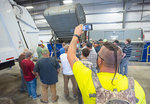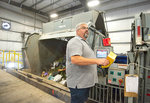Clear, 52° F
More than 115 officials from across the state came to Powell Tuesday for a tour of one of the city’s pride and joy, the sanitation transfer station. Like teens at a Justin Bieber concert, the …
This item is available in full to subscribers.
The Powell Tribune has expanded its online content. To continue reading, you will need to either log in to your subscriber account, or purchase a subscription.
If you are a current print subscriber, you can set up a free web account by clicking here.
If you already have a web account, but need to reset it, you can do so by clicking here.
If you would like to purchase a subscription click here.
Please log in to continue |
|


More than 115 officials from across the state came to Powell Tuesday for a tour of one of the city’s pride and joy, the sanitation transfer station. Like teens at a Justin Bieber concert, the crowd took photos and videos of the rock star operation, one of only three like it in Wyoming.
Powell Sanitation Superintendent Allen Griffin led the large group of members from the Wyoming Solid Waste and Recycling Association on the tour. They could have been there for the catered lunch they enjoyed prior to the tour. Despite processing 5,000 tons of residential garbage a year, the station is clean and without a smell of refuse permeating the premises or adjacent neighborhood.
“I could have washed the floor and had Thanksgiving dinner there,” Griffin joked with the crowd. “Everything is contained.”
The wisecrack, which brought more than a few chuckles from the crowd, isn’t that far of a stretch. When you think about the solid waste business, the last word coming to mind would be tidy. That was the attitude prior to the city building the facility about a decade ago at 413 N. Ingalls Street.
When the station was proposed, neighbors were dead-set against the facility being constructed two blocks from the main drive, which is home to several hotels, businesses and restaurants. And they definitely didn’t want it next to their homes.
The facility opened just before Thanksgiving in 2013. Griffin knew it would be a huge test of the system. But it came through with flying colors and there hasn’t been a single complaint about rats, flies or stench in the past nine years, Griffin said.
The system is nifty in its simplicity. City garbage trucks back up to Transtor brand containers located inside the transfer station, dump their loads and then the waste is automatically moved into large haulers equipped with compactors to ensure no space is wasted when they hit the road.
No garbage hits the ground at the facility, resulting in the near elimination of smell, critters and creepy crawlers.
“We’ve had two mice and one of them was in the building before there was any garbage here. So we don’t have those problems. We’re able to keep it clean,” Griffin boasted. “It’s a pride of ownership type thing.”
Once full, a city truck pulls in and hauls the waste to the Park County Landfill. The haulers can carry up to 40,000 pounds of solid waste at a time, meaning less trips to the dump.
Until Aug. 1, the city hauled its waste to Billings – for a better price. But the area landfill and the city worked out their differences and entered into a long-term contract.
“It’s good for them, and it’s good for us. And I think it’s going to be a good fit for years to come,” he said.
The city also purchased its own truck to pull the haulers, ending itscontract with more expensive subcontractors.
Despite Griffin’s frugal nature, the sanitation department raised its rates this year for the first time in 14 years. The rate hike was largely due to recent fuel price increases. But the department isn’t done trying to save customers money. It also recycles commercial cardboard to bring in additional revenue and is testing a program to recycle grass clippings.
More than 100 residents in Powell have access to new grass clipping bins. Griffin delivered handbills to the neighborhood describing the process and the reasons the city is looking into developing a city-wide program.
During the summer, grass clippings make up a significant portion of solid waste carried by the city. It costs just as much per pound to dispose of it in the landfill as other solid waste. But, if the city’s trial program works, clean clippings can be dumped for free to be used as needed compost.
The program could save the city a lot, but keeping the trimmings clean is tough. People have dumped other trash in the bins, from sacks of kitchen waste to appliances, forcing the city to lock the larger portion of the lids with padlocks — to discourage the improper dumping of larger items in the special-use bins. It’s all in an effort to save time, money and fuel, Griffin said.
The current test neighborhood will shed some light on the savings. If it doesn’t end up saving the city money, it will be discontinued, he said.
“Recycling needs to at least attempt to pay for some of its own costs.”
Travis Evans, president of the association, said transfer stations are becoming popular in Wyoming.
“Smaller communities actually love having a transfer station versus landfill because it allows them to better control odor and windblown litter and just makes for a cleaner facility, and easier to manage,” he said, adding “They’re making sure they get the most bang for their buck when it comes to all-in costs.”
Association delegates toured the city solid waste transfer station, the Park County Landfill and the Powell recycling center.
Myron Heny, former City of Powell sanitation superintendent, is a lifetime board member of WSWRA. Heny is also vice chairman of the Powell Valley Recycling Center, and he said WSWRA members appreciate the way the recycling center personnel handles recycled materials. There is no uncontrolled drop-off of materials outside the recycling center.
“A lot of our recyclers are elderly, and our guys are right there to help with handling materials. They help them in the door, and they don’t have to push the big containers open themselves,” Heny said.
The city golf course was also popular with WSWRA. “They loved it,” said Heny.